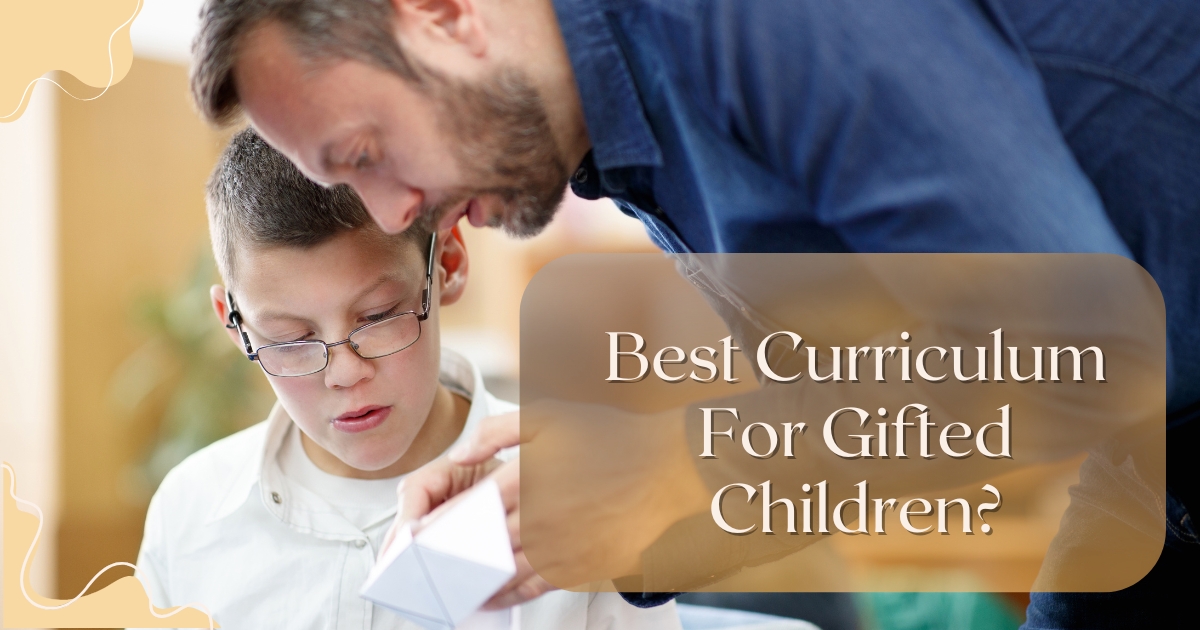Selecting the right curriculum for gifted children can be challenging for homeschooling parents. Gifted learners often require more advanced, varied, and stimulating educational resources to keep them engaged and help them thrive. This post explores some of the best homeschooling curriculums and approaches for advanced learners, along with resources that help nurture their unique abilities.
Whether your child excels in math, reading, the arts, or critical thinking, there are options to meet their needs.
Characteristics Of Gifted Children And Their Educational Needs
Gifted children are those who demonstrate above-average intelligence, exceptional creativity, or advanced skills in specific areas. While these characteristics sound exciting, how you approach homeschooling can make a massive difference.
Gifted learners:
- Grasp concepts quickly and need less repetition.
- Exhibit intense curiosity with a passion for exploring topics in depth.
- Require flexibility to learn at their own pace.
- Often have asynchronous development, meaning their intellectual abilities may not align with their emotional or social maturity.
A one-size-fits-all curriculum may fail to meet these complex needs. This is why using tailored programs or resources for homeschooling gifted children is vital.
Homeschooling Programs For Advanced Learners
Homeschooling parents often seek structured programs that cater to gifted learners. Here are some of the most popular and effective options to consider:
- Online Curriculums
For families seeking flexibility, online homeschooling platforms are a blessing. Many of them include self-paced courses, interactive lessons, and challenging material designed for gifted students.
Examples include:
- CTY Online Programs (Johns Hopkins Center for Talented Youth): These offer advanced courses in subjects such as computer science, math, and literature for K-12 learners.
- Khan Academy: Although free, its lessons in advanced math, science, and computing challenge even the brightest students.
- Time4Learning: Their curriculum spans PK-12 and allows kids to work at their level, whether ahead or behind in certain subjects.

- Classical Education Approach
Classical education breaks learning into three phases:
- The Grammar Phase focuses on foundational knowledge through memorization.
- The Logic Phase introduces critical thinking.
- The Rhetoric Phase emphasizes articulation and reasoned expression.
Many gifted children thrive in this rigorous and structured model. Programs like Memoria Press and The Well-Trained Mind are great options for homeschoolers interested in classical education.
- Project-Based Learning (PBL)
Some gifted learners excel in hands-on environments where they can apply knowledge creatively. PBL emphasizes student-driven projects on topics that motivate them. For instance:
- Building a bridge for an engineering-focused lesson.
- Writing and producing a play to combine language arts with performance.
- Customizable Curriculums
Curriculums like Moving Beyond the Page and Oak Meadow cater specifically to advanced learners. They allow for adjustment of activities and depth based on the student’s abilities, balancing academics with enrichment.
- Subject-Specific Programs
Sometimes, a child’s giftedness lies in one specific subject. Specialized curriculums, such as Beast Academy for math or Brave Writer for creative writing, allow parents to hone these strengths while addressing other areas with a more generalized approach.
Education Resources for Gifted Kids
Beyond curriculums, many additional resources can help gifted children. Access to supplementary materials and community tools enriches the homeschool experience. For example, libraries offer free access to complex texts, inspiring young readers. Likewise, museum memberships can create opportunities to experience hands-on scientific or historical learning.
Many parents of gifted children look for classes, camps, or clubs where their kids can interact with peers who share their interests and talents. From robotics teams to coding camps, these settings allow kids to develop friendships while continuing to explore the subjects they love. Local homeschooling co-op groups or online communities (like Mensa Kids) are excellent platforms to connect with other families on the same educational path. When combined with a strong curriculum, these resources provide balance and depth to a gifted child’s learning environment.
Enrichment Activities to Complement Your Curriculum
Gifted children thrive when their education includes a mix of academics, creativity, and experiential learning. Enrichment activities keep homeschooling engaging and open new doors for exploration.
Here are ideas to integrate enrichment activities into your homeschooling routine:
- Nature Exploration: Encourage science learning through outdoor activities like bird watching, gardening, or studying ecosystems.
- Creative Endeavors: Support your child’s artistic or musical interests by introducing painting, sculpture, or learning an instrument.
- Language Immersion: Use apps or online resources such as DuoLingo or Rosetta Stone to start learning a new language.
- Competitions: Provide opportunities to participate in math competitions, spelling bees, or coding challenges.
- Book Clubs: Organize reading circles to expose them to classic literature or contemporary novels and encourage critical thinking.
Balancing academic excellence with creativity ensures a well-rounded development for your advanced learner.
Social And Emotional Considerations For Gifted Kids
The social and emotional needs of gifted children are equally critical as their academic requirements. Many gifted learners struggle with feelings of isolation or frustration because their peers may not understand their advanced thinking. This is one reason a parent’s approach to socialization is so important.
Look for mentors, role models, and educators who recognize and celebrate your child’s intellectual and emotional uniqueness. Coaching them into teamwork during homeschool co-op activities, group science experiments, or debate clubs helps them learn collaborative skills while navigating different dynamics. Active listening and creating safe zones for them to express frustrations or anxieties also build confidence.
Understanding and addressing these emotional nuances ensures that your gifted child feels valued, supported, and socially connected.
Key Features To Look For In A Curriculum
When shopping for the best curriculum for gifted children, keep these features top of mind:
Flexibility
A curriculum needs to allow your child the freedom to pick subjects of interest, accelerate through familiar topics, and pause to explore challenging areas.
Depth
Gifted learners often enjoy deeper dives into concepts that extend into specialized knowledge. Look for curriculums offering optional extensions and extra materials.
Assessment Tools
Advanced learners may need formative assessments that track mastery rather than basic proficiency. Programs with adaptive assessments are ideal for meeting this need.
Student-Led Learning Opportunities
Some of the best programs enable students to follow their curiosity by integrating research projects, experiments, or independent study units.
Multi-Age Adaptability
Many gifted children aren’t at the same educational level across all subjects. Curriculums that allow cross-level learning help address their asynchronous development.
Balancing Independence and Guidance in Homeschooling
Gifted children often crave independence, but even the brightest learners benefit from parental guidance. Striking a balance is crucial. Give your child the space to explore topics at their pace, but also provide structure and encouragement when needed.
Try strategies like:
- Setting Weekly Goals: Allow your child to help craft their schedule to feel ownership of their learning.
- Offering Checkpoints: Regularly review progress so that challenges or misunderstandings can be addressed.
- Encouraging Research: For independent thinkers, encourage online research or reading beyond the scope of curricula.
- Stretch Assignments: Challenge them with tasks slightly outside their comfort zone to maintain momentum.
When children feel supported yet empowered, their confidence, curiosity, and love of learning will grow tremendously.
Final Thoughts on Choosing the Right Curriculum
No single curriculum works equally for every gifted child, and that’s okay. The beauty of homeschooling is that you can adapt based on your child’s needs. Whether you lean into online courses, project-based learning, or specialized academic tracks, the key lies in remaining flexible and open to experimentation.
Pairing a strong base curriculum with resources, tools, and your child’s passions creates a learning environment where they can flourish. Gifted learners are full of potential, and as parents, you have the unique opportunity to guide them toward becoming lifelong learners and confident individuals.





